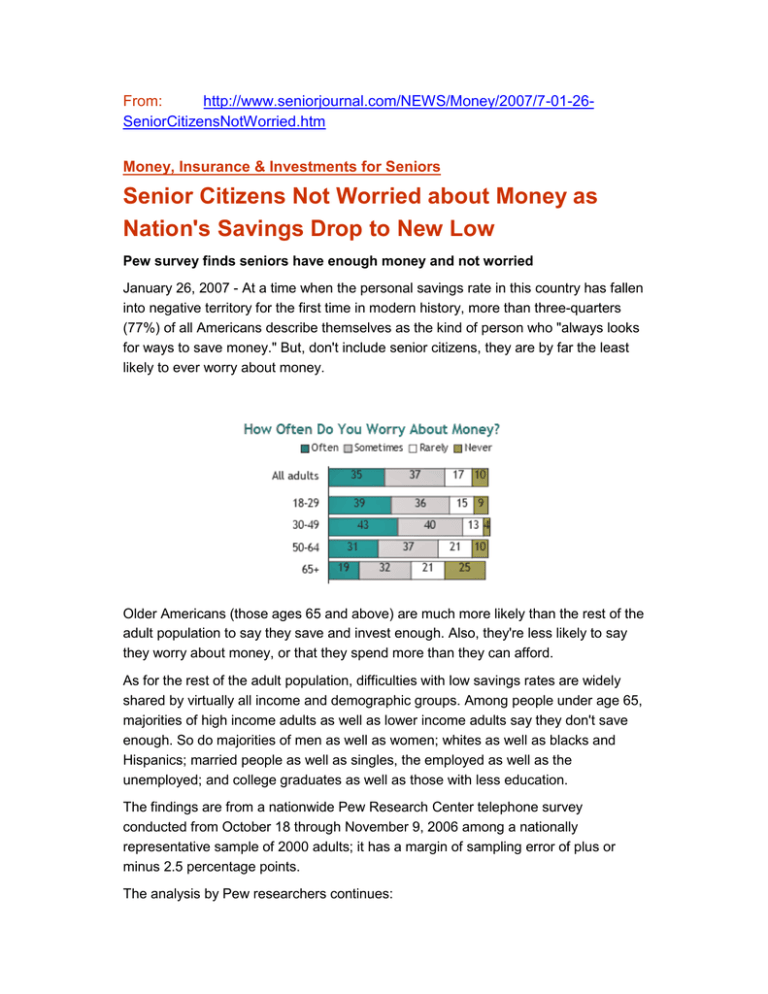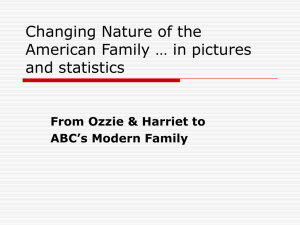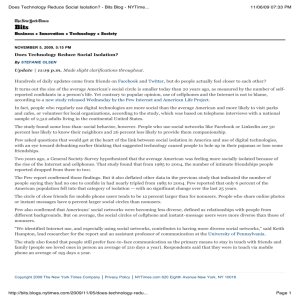Senior Citizens Not Worried about Money as Nation's Savings Drop to New Low
advertisement

From: http://www.seniorjournal.com/NEWS/Money/2007/7-01-26SeniorCitizensNotWorried.htm Money, Insurance & Investments for Seniors Senior Citizens Not Worried about Money as Nation's Savings Drop to New Low Pew survey finds seniors have enough money and not worried January 26, 2007 - At a time when the personal savings rate in this country has fallen into negative territory for the first time in modern history, more than three-quarters (77%) of all Americans describe themselves as the kind of person who "always looks for ways to save money." But, don't include senior citizens, they are by far the least likely to ever worry about money. Older Americans (those ages 65 and above) are much more likely than the rest of the adult population to say they save and invest enough. Also, they're less likely to say they worry about money, or that they spend more than they can afford. As for the rest of the adult population, difficulties with low savings rates are widely shared by virtually all income and demographic groups. Among people under age 65, majorities of high income adults as well as lower income adults say they don't save enough. So do majorities of men as well as women; whites as well as blacks and Hispanics; married people as well as singles, the employed as well as the unemployed; and college graduates as well as those with less education. The findings are from a nationwide Pew Research Center telephone survey conducted from October 18 through November 9, 2006 among a nationally representative sample of 2000 adults; it has a margin of sampling error of plus or minus 2.5 percentage points. The analysis by Pew researchers continues: "These concerns are borne out by government data. The U.S. Commerce Department's Bureau of Economic Analysis has estimated that, since April of 2005, the American public has been spending more money than it has earned after taxes-an unprecedented development in the past half century.1 As recently as the early 1980s, Americans on average had been saving more than 10 percent of their after tax earnings. "Also, the Federal Reserve System reports that total household debt has risen sharply in the past decade, due largely to increases in mortgage debt.2 "However, despite both the negative savings rates and the growth in household debt, the median financial wealth of families has continued to rise, due mainly to increases in the value of peoples' homes and/or their stock holdings.3 Indeed, economists have argued that this "wealth effect" may at least partly explain today's historically low savings rates. As people have seen value of their assets grow, this theory goes, they may feel more freedom to spend and less need to save. "The Pew survey offers little more than marginal support for this hypothesis. It finds that about half of all homeowners (46%) say that the value of their home has increased "a lot" in recent years. In their saving and spending habits, this group does differ a bit from the rest of the population. "They are a bit less likely to say they often or sometimes spend more than they can afford (27% versus 35% among other homeowners and 47% among renters). They also report a slightly lower propensity to worry about money. But they're no different from the rest of the population in their inclination in their description of themselves as the kind of person who is always looking for ways to save. "Similarly, respondents who are market investors worry less about money than do those who don't have any such financial investments. They're also more likely to say they save and invest enough, and they're less likely to say they spend more than they can afford. It should be noted, however, that market investors are also more likely to have high incomes, and having a high income also correlates independently with these same saving and spending characteristics. Below are some of the charts showing how the attitudes of senior citizens compare with younger generations. Boomers are slightly more likely to describe themselves as "savers" but this is probably because seniors are not worried about saving. Half of seniors say they are saving and investing enough, much more than younger generations. One fourth of senior citizens never worry about money - leave that to the youngsters. Retirees are most comfortable with their financial situation. About the Pew Social Trends Reports The Pew social trends reports explore the behaviors and attitudes of Americans in key realms of their lives - family, community, health, finance, work and leisure. Reports analyze changes over time in social behaviors and probe for differences and similarities between key subgroups in the population. The surveys are conducted by the Pew Research Center, a nonpartisan "fact tank" that provides information on the issues, attitudes and trends shaping America and the world. Survey reports are the result of the collaborative effort of the social trends staff, which consists of Paul Taylor, Executive Vice President, Cary Funk, Senior Researcher and April Clark, Research Associate Related Reports from the Pew Research Center Most Americans Moderately Upbeat About Family Finances in 2007. January 2007. Pew Research Center. Luxury or Necessity?: Things We Can't Live Without: The List Has Grown in the Past Decade. December 2006. Pew Research Center. As Home Prices Cool Down, Homeowners Temper Their Optimism. December 2006. Pew Research Center. Online Banking 2006: Surfing to the Bank. June 2006. Pew Internet & American Life Project.


